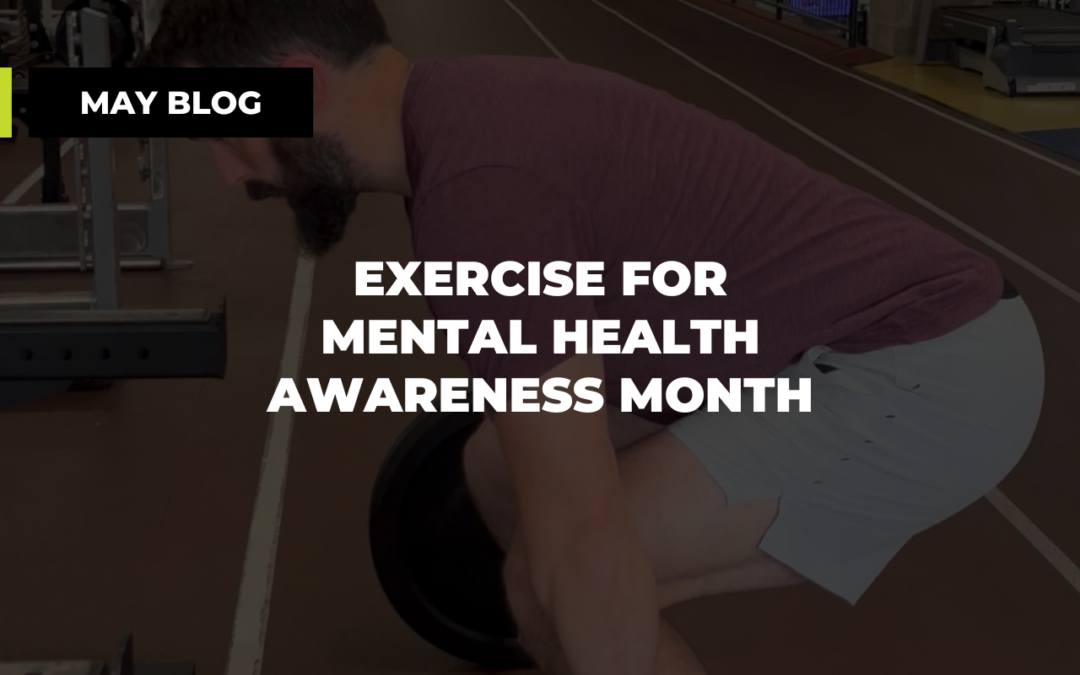This month is Mental Health Awareness Month so let’s talk about how we can use exercise to improve our mental health.
[Updated, May 2025]
This is a topic that has become extremely important to the world, and our community, in the last few years.
First, we need to establish benefits of exercise on mental health, then I will try to help you use exercise to improve yours.
Most people who exercise regularly will tell you how different they feel on days when they don’t get their workouts in. They may feel more irritable, anxious or have less energy. I am absolutely in that camp.
STRESS – In April of 2023, Matt explained the sympathetic nervous system as the “fight or flight” controller. One study comparing trained to untrained men found that those who exercise regularly had a generalized ability to better deal with stress. In this study they measured cortisol, blood pressure and heart rates. The results showed these stress measures were lower in trained men after a psychosocial stressor, in this case public speaking and a math test in front of observers. In those with regular exercise, there was an observed smaller increase in this response and a quicker return to baseline levels of these measures after stress for those who exercised regularly.
DEPRESSION – There is also evidence that within four weeks of beginning an exercise routine, depressive symptoms can start to subside. Conversely, a sedentary lifestyle is correlated with depression. One lit review found that, based on current research, thirty minutes a day, three days per week, preferably with supervision is helpful in treating major depressive disorder.
IMPROVED MOOD In addition to decreasing chemicals and measures associated with stress and anxiety, exercise has been shown to improve mood by releasing chemicals associated with positive mood states. One study found exercise actually expands our capacity for joy by increasing the number of dopamine receptors. Experiences that you enjoy become more enjoyable with long term exercise adherence.
IMPROVED CONFIDENCE Another positive effect that exercise has on mental health is an increase in self-confidence. People who set goals, take action, and accomplish goals see that they are capable of doing hard things and become more confident and efficacious. Starting an exercise program, seeing it through, seeing changes and accomplishing something once thought of as unattainable or difficult is very empowering and spills over into other parts of life.
How to use exercise to improve your mental health
- Try different types, see what you like – there is no type of exercise you absolutely MUST do and it should absolutely ADD to your enjoyment of life. Personally, I used to dislike cardio but now I really enjoy running. As soon as it starts to add stress and become a burden, you should consider finding a new routine.
- Have a plan to make things easier – Coming into the gym with a plan limits the chances of skipping by taking out all the guesswork. It also ensures you are actually progressing. If you need help coming up with a plan, meet with one of our trainers and we can help you out either through personal training or by getting you set with a personalized program.
- Make yourself a priority – Don’t view it as selfish. You are the most important person in your life and you deserve to have time to take care of yourself. The phrase you have likely heard recently is “You cannot pour from an empty cup” so make sure you take the time.
- Set a goal – Decide what you want to accomplish. Set your sites on something that is challenging. Research has shown that working long term towards a difficult (but realistic) goal can be very rewarding and brings more enjoyment to the activity. Again, if you need help figuring out a goal, talk to one of our trainers.
Exercise and physical activity have obvious physical benefits. And now you have seen just a few of the psychological benefits as well. Hopefully you find these tips on how to use exercise for mental health useful, but there is something to remember. Don’t expect every day to be the best workout you’ve ever had. Some days, even with the most fun, exciting exercise program will still be tough to get motivated. But when they are more often a burden than enjoyable or you start to feel like they are taking away from your enjoyment instead of adding to it, consider trying something new.
To reiterate another point from last month’s blog, it does not take 2 hours of gym time per day to see these positive effects. 2.5 hours of moderate physical activity or 1.25 hours of vigorous activity per week are enough to show significant improvements in these mental health variables.
REFERENCES:
1 Rimmele, Ulrike, et al. “Trained Men Show Lower Cortisol, Heart Rate and Psychological Responses to Psychosocial Stress Compared with Untrained Men.” Psychoneuroendocrinology, vol. 32, no. 6, 2007, pp. 627–35, www.ncbi.nlm.nih.gov/pubmed/17560731, https://doi.org/10.1016/j.psyneuen.2007.04.005.
2 de Coverley Veale, D.M.W. “Exercise and Mental Health.” Acta Psychiatr. Scand., vol. 76, 21 Feb. 1987, pp. 113–120. Accessed 16 Apr. 2023.
3 Roshanaei-Moghaddam, Babak, et al. “The Longitudinal Effects of Depression on Physical Activity.” General Hospital Psychiatry, vol. 31, no. 4, 2009, pp. 306–315., https://doi.org/10.1016/j.genhosppsych.2009.04.002.
4 Nyström, Markus B. T., et al. “Treating Major Depression with Physical Activity: A Systematic Overview with Recommendations.” Cognitive Behaviour Therapy, vol. 44, no. 4, July 2015, pp. 341–52. DOI.org (Crossref), https://doi.org/10.1080/16506073.2015.1015440.
5 Robertson, Chelsea L, et al. “Effect of Exercise Training on Striatal Dopamine D2/D3 Receptors in Methamphetamine Users during Behavioral Treatment.” Neuropsychopharmacology, vol. 41, no. 6, 1 May 2016, pp. 1629–1636, www.ncbi.nlm.nih.gov/pmc/articles/PMC4832026/, https://doi.org/10.1038/npp.2015.331. Accessed 11 Apr. 2022.
6 Tikac, Gulsum, et al. “Regular Exercise Improves the Levels of Self-Efficacy, Self-Esteem and Body Awareness of Young Adults – the Journal of Sports Medicine and Physical Fitness 2022 January;62(1):157-61.” Www.minervamedica.it, 2021, www.minervamedica.it/en/journals/sports-med-physical-fitness/article.php?cod=R40Y2022N01A0157. Accessed 16 Apr. 2023.
7 Sheldon, K. M., Abad, N., Ferguson, Y., Gunz, A., Houser-Marko, L., Nichols, C. P., & Lyubomirsky, S. (2009, December 8). Persistent pursuit of need-satisfying goals leads to increased … Retrieved April 16, 2023, from https://gmdconsulting.eu/nykerk/wp-content/uploads/2020/02/Persistent-pursuit-of-need-satisfying-goals-leads-to-increased.pdf


